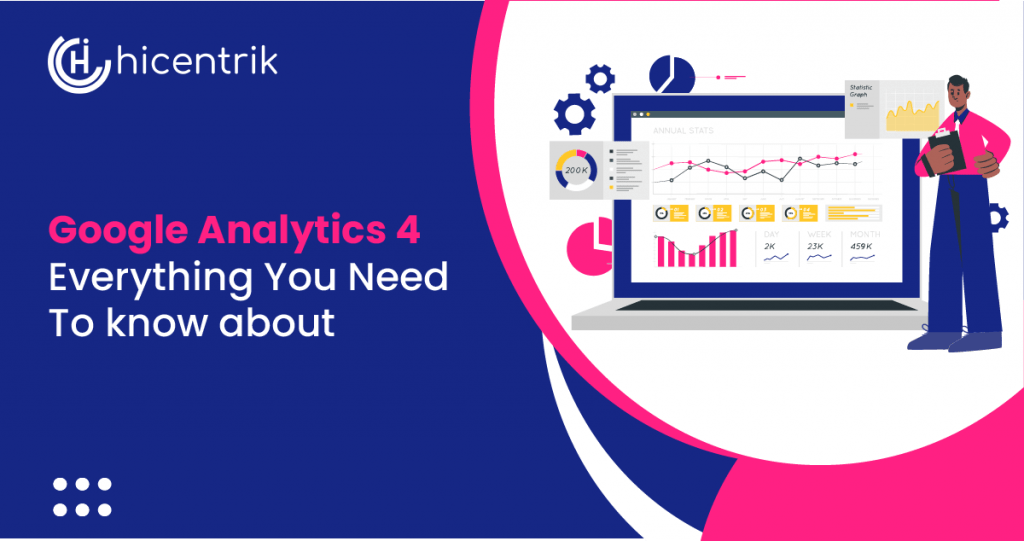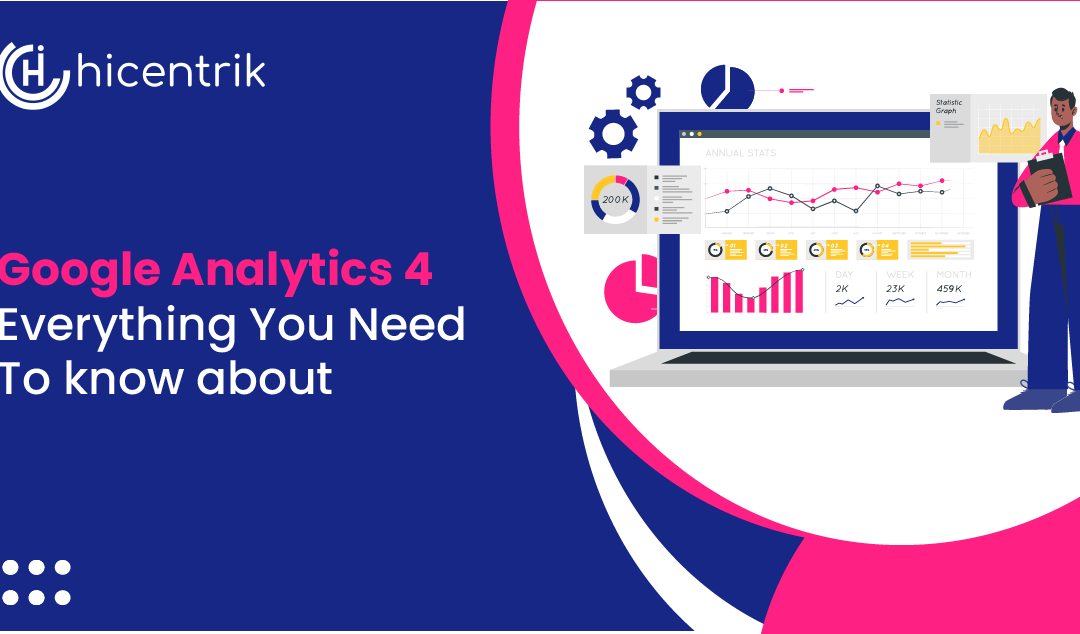
As tech-based advancements run the throne for enterprises worldwide, businesses should learn to stay atop their online presence for being more competitive. One vital aspect of amplifying online visibility is understanding website traffic and user intent. This is where Google Analytics (GA) comes into the big picture. It is a web analytics feature offered by Google to get detailed insights into website traffic and user behavior. Google is well-known for its algorithm updates and recently the search engine giant released its latest version of GA known as Google Analytics 4 or GA4. Wondering how to use GA4, or how GA4 can help with search engine optimization? Here’s a Google Analytics 4 guide to help you out!
What Is Google Analytics 4 or GA4?
Google Analytics 4 is the latest version of Google Analytics, released in October 2020. It’s a completely new approach to analytics designed to provide more insights into user behavior across different devices and platforms. GA4 is built on a new data model hyper-focused on events and user behavior, rather than page views and sessions, as seen in Universal Analytics.
GA4 also introduces new features such as machine learning-powered insights, cross-device tracking, and more granular data controls. The new data model also makes it easier to track user behavior across different devices and platforms, which is becoming increasingly important as more people use multiple devices to access websites.
What is the Difference Between Google Analytics 4 and Universal Analytics?
The main difference between GA4 and Universal Analytics is the data model. GA4 uses an event-based data model, whereas Universal Analytics uses a session-based data model. In Universal Analytics, data is collected based on sessions, defined as a series of interactions by a user within a given time frame. Sessions end after 30 minutes of inactivity or at midnight.
In GA4, data is collected based on events, which are user interactions with a website or app, such as clicks, page views, and purchases. Events can be categorized to make it easier to analyze user behavior, and this new data model makes it easier to track user intent across different devices and platforms.
Another significant difference is the reporting interface. GA4 has a more streamlined and customizable reporting interface than Universal Analytics, which provides more insights into user intent. GA4 also introduces new ML-powered insights, making it easier to identify trends and patterns in intent data, which makes the role of GA4 in SEO quite substantial.
How Does GA4 Help With Reporting?
GA4 helps with reporting by providing more granular data and machine learning-powered insights. The new data model makes it easier to track user behavior across different devices and platforms, providing more comprehensive insights into user attributes. The new reporting interface in GA4 is also more customizable, allowing businesses to create custom reports and dashboards tailored to their specific needs. This provides businesses the chance to dunk deep into vivid insights, hence enabling them to make more informed decisions.
What Are the Types of Analysis in GA4?
GA4 offers several types of analysis, including:
- User Analysis: GA4 provides more granular data on user behavior, such as how often users visit a website, how long they stay on a website, and what actions they take on a website.
- Engagement Analysis: The analytics offers insights into how users engage with a website, such as which pages they visit and how long they stay on each page.
- Conversion Analysis: GA4 also provides data on how users convert on a website, such as by buying or filling out a form.
- Retention Analysis: This analysis involves how often users return to a website and how long they continue to engage with a website.
- Funnel Analysis: Funnel analysis means analyzing how users move through a website or app, such as which pages they visit before making a purchase.
The role of GA4 in SEO
In case you are wondering if you should reach out to experts for SEO service, here’s the role of GA4 in search engine optimization:
- Track user behavior: GA4 tracks user behavior on your website, including pages, visited, time spent on each page, and click-through rates. This data helps you understand user engagement with your website and identify areas for improvement.
- Monitor website traffic: GA4 allows you to track your website’s traffic sources, including organic search, paid search, and social media. This information helps you measure the effectiveness of your SEO and other marketing efforts.
- Identify top-performing pages: GA4 enables you to identify the pages on your website that are driving the most traffic and engagement. This data helps you optimize these pages for better performance and improve the overall user experience.
- Measure conversions: GA4 can help you to track website conversions, such as form submissions and e-commerce transactions. This data helps you understand the effectiveness of your SEO and other marketing campaigns in driving conversions.
- Analyze audience demographics: GA4 provides information on your website’s audience demographics, such as age, gender, and location. This data helps you understand your target audience better and tailor your SEO and other marketing efforts accordingly.
- Understand user journeys: GA4 allows you to track user journeys on your website, from the first visit to the final conversion. This information helps you identify areas for improvement in the user experience and optimize your SEO and other marketing efforts accordingly.
- Integrate with other tools: GA4 can be integrated with other Google tools, such as Google Ads and Search Console, to provide a more comprehensive view of your SEO and other marketing efforts.
Conclusion: Should You Make the Switch to GA4?
Whether you should switch to GA4, or not depends on your business needs and objectives. If you are using Universal Analytics and are happy with the data you are getting, switching to GA4 immediately won’t be necessary. However, if your business relies on more granular data and vividly personalized reporting, GA4 is worth considering. Also, Google has made a bold statement that GA4 will eventually replace Universal Analytics. Thus, reaching out to professional SEO services in UAE for advanced SEO is more of a mandate than an alternative.
Nikita Sharma is Chief Strategy Centrik @ hicentrik. She Strategizes, Optimizes & Revises digital activities to deliver optimum results & returns.
6 Years of Global Experience in Multi-tasking, i.e. Digital Advertising, Social Media, Ad Campaigns, Web Design & Development, Lead Generation, and Reporting.




